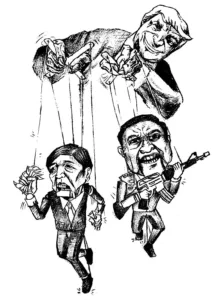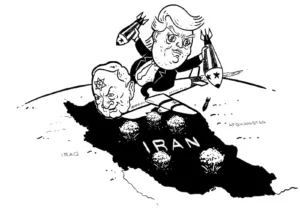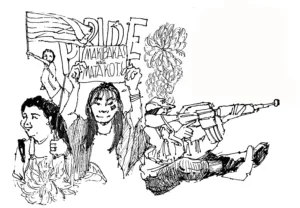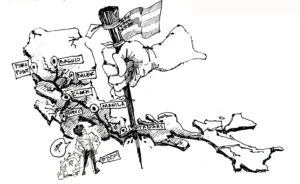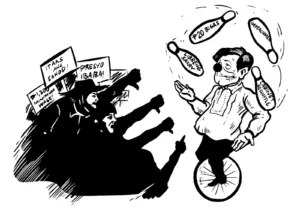By JAN FERMON
Progress Lawyers Network
and Committee DEFEND International
It is obvious that Prof. Sison, like any EU citizen, has an interest to know how the Council takes the decision to label a person or an organisation as “terrorists”. The whole proceeding leading to very harsh sanctions has been set up as an administrative proceeding. The Council argues that there are no requirements of fair trial in such proceedings. The regulation has been made by the Council on the basis of its executive power. The list has been established as well by the Council on the basis of a secret file, probably based on secret service information. No contradiction whatsoever has been foreseen and no judicial review is foreseen before sanctions are imposed.
Court of First Instance of the European Union in Luxemburg makes chilling decision in the case of Professor Jose Maria Sison
By JAN FERMON
Progress Lawyers Network
and Committee DEFEND International
On April 26, 2005 the European Court of First Instance in Luxemburg announced a decision on the application filed by Prof. Jose Maria Sison for the annulment of the decisions of the Council of the European Union to refuse him access to the file on which his inclusion in the so-called terrorist list is based. The decision of the court confirms the initial refusal decisions of the European Council. It is still subject to appeal, which we are committed to pursue.
It does not cover the main case concerning the application filed by Prof. Sison before the same court for the annulment of the decision of the European Council to include his name in the list of persons and entities whose assets are frozen on the basis of the allegation that they are facilitating or committing terrorism. This application is still pending before the Court.
Some Background
Prof. Sison is a Filipino living in the Netherlands since 23 January 1987. As founder and first chairman of the Central Committee of the Communist Party of the Philippines, he was imprisoned and tortured under the Marcos dictatorship for 8 years, from 1977 to 1986
After his release upon the fall of the Marcos regime in 1986, he travelled abroad in order to give university lecture tours in around 25 countries. His life being threatened in the Philippines by reactionary military circles, he established himself in the Netherlands where he has been living for almost two decades now.
In the early 1990s, the National Democratic Front of the Philippines (NDFP) and the Government of the Republic of the Philippines (GRP) engaged in peace negotiations. Prof. Sison accepted to become chief political consultant of the NDFP negotiating panel and contributed in this way to the forging of several important agreements between the NDFP and the GRP.
In the aftermath of the 9/11 events, the United States got involved directly in military operations in the Philippines. A plan is being carried out for the US to reoccupy the military bases it had left in 1992 under the pressure of a broad mass movement in the Philippines. And the GRP negotiating team has been demanding that the NDFP sign a capitulation agreement, violating the previous agreements which require that the root problems of the armed conflict be addressed by the GRP-NDFP peace negotiations.
In the context of pressuring the NDFP, the US included Prof. Sison in its “foreign terrorist” listing on 12 August 2002. On 13 August the Netherlands did the same. Prof. Sison was deprived of all basic rights, his social allowance, his health insurance and was ordered to leave his house.
A court case was filed before a Dutch court but before it was concluded the Council of the European Union included Prof. Sison’s name in the European list.
It is very obvious that the decision to put Prof. Sison on the “terrorist” list was politically motivated. The Philippine foreign affairs secretary, Blas Ople, stated publicly that Prof. Sison would be taken off the list if the NDFP signed the capitulation agreement proposed by the GRP. Prof. Sison has nothing to do with terrorism. He publicly and strongly condemned such acts in the past. The Dutch justice minister stated that there was not even a ground to start a criminal investigation against Prof. Sison. No criminal proceedings are pending against him to this day. And the amount on the blocked account never exceeded €2,000 during the last 10 years. That should make it very clear that the sanctions imposed on Prof. Sison are of no use whatsoever in the fight against terrorism.
A Case Entirely Based on a “Secret File”
Prof. Sison immediately requested access to the documents that were submitted to the European Council and that became the ground to publicly label him as a terrorist and to punish him as such. Prof. Sison made this request under Regulation (EC) No 1049/2001, availing of the right of any citizen to request access to EU documents.
The Council refused to give him access arguing ‘disclosure of [those reports] and of the information in possession of the authorities of the Member States combating terrorism, could give the persons, groups or entities which are the subject of this information the opportunity to prejudice the efforts of these authorities and would thus seriously undermine the public interest as regards public security’. Secondly, in the Council’s view, the ‘disclosure of the information concerned would also undermine the protection of the public interest as regards international relations because third States’ authorities [we]re also involved in the action taken in the fight against terrorism’. Furthermore, the Council stated that some documents had been returned to the member states that produced them. It also said that it could not disclose the identity of these member states because of their refusal to be identified.
Prof. Sison filed an application for annulment of this decision (in fact three consecutive decisions of the same kind) of the European Council. This is a case subsidiary to the main case.
In the main case, still pending in the Luxemburg court, in which Prof. Sison applied for annulment of the decision to include him in the list of “terrorists” he argued precisely that no fair trial was possible without the “evidence” being submitted to scrutiny and contradiction. But the Council did not produce before the Court any documents that could link Jose Maria Sison to terrorist activities.
The April 26 decision of the Luxemburg court in the case on access to documents can be summarized as follows:
- The question whether these documents should be submitted to scrutiny and contradiction is a question that has to be solved in the case pending on the inclusion in the list. The particular interest of Sison to have access cannot be taken into consideration in a request based on the general transparency regulation.
- The Council had the right to consider the requested documents as particularly sensitive.
Both lines of argument are chilling and worrisome.
It is obvious that Prof. Sison, like any EU citizen, has an interest to know how the Council takes the decision to label a person or an organisation as “terrorists”. The whole proceeding leading to very harsh sanctions has been set up as an administrative proceeding. The Council argues that there are no requirements of fair trial in such proceedings. The regulation has been made by the Council on the basis of its executive power. The list has been established as well by the Council on the basis of a secret file, probably based on secret service information. No contradiction whatsoever has been foreseen and no judicial review is foreseen before sanctions are imposed.
Even more chilling and worrisome are the considerations of the Court concerning the sensitive character of the documents. Although they are formulated in a decision on the application of a general “transparency” regulation, their wording is such that they could be applied without any difficulty to deny access to the documents even in the particular situation of an individual requesting access to the secret file that has led to his labelling as a terrorist.
The Court states for example: “80 That international cooperation concerning terrorism presupposes a confidence on the part of States in the confidential treatment accorded to information which they have passed on to the Council. In view of the nature of the document requested, the Council was therefore able to consider, rightly, that disclosure of that document could compromise the position of the European Union in international cooperation concerning the fight against terrorism.”
This is a wording so general that it can be used in any case and in any situation to refuse access to a secret file to a person subject to sanctions. The decision of the Court is therefore not only a threat to transparency but also to the most basic rights of defence and to the right to a fair trial.


